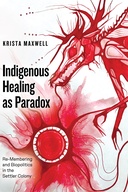Explore

Indigenous healing is a paradox in the liberal settler colony where efforts to foster well-being can simultaneously undermine distinct Indigenous societies. This book examines the prominence of “Indigenous healing” in Canadian public discourse through a historical and ethnographic lens. It focuses on late twentieth-century Indigenous social histories in Treaty 3 territory and cities in northern and southern Ontario to show practices of re-membering—drawing on traditional ways of being and knowing for social repair and collective rejuvenation—against the backdrop of the social dismemberment of Indigenous Peoples. Expansion of re-membering is often enabled by tactical engagements with the settler state which have fuelled an Indigenized biopolitics from below. Maxwell offers an analysis of the possibilities, tensions, and risks inherent to these biopolitical tactics. Informed by Indigenous feminist scholarship that emphasizes relationality, care, and the everyday, as well as the intimate workings of settler colonialism, this book aims to enrich critical conversations about reconciliation and resurgence politics and challenge their perceived dichotomy.
This book is included in DOAB.
Why read this book? Have your say.
You must be logged in to comment.
Rights Information
Are you the author or publisher of this work? If so, you can claim it as yours by registering as an Unglue.it rights holder.Downloads
This work has been downloaded 46 times via unglue.it ebook links.
- 46 - pdf (CC BY-NC-ND) at booksonix.com.
Keywords
- abuse
- activism
- Addiction
- Anishinaabeg
- Family
- gender
- Healthcare
- illness
- JBFN - Health, illness and addiction: social aspects
- JBSL11 - Indigenous peoples
- JHMC - Social and cultural anthropology
- Medical anthropology
- Mental health
- social actors
- social services
- Survival
- survivance
- Violence
- Welfare State
- Well-being
- Women
Editions

